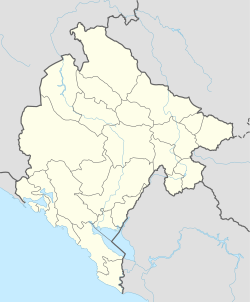Vranjina
Vranjina | |
|---|---|
Village | |
 Vranjina, view from Žabljak Crnojevića | |
| Coordinates: 42°16′42″N 19°08′05″E / 42.27833°N 19.13472°E | |
| Country | |
| Municipality | |
| Population (2011) | |
| • Total | 209 |
| Time zone | UTC+1 (CET) |
| • Summer (DST) | UTC+2 (CEST) |
Native name: Врањина | |
|---|---|
 | |
 | |
| Geography | |
| Location | Lake Skadar |
| Coordinates | 42°16′26″N 19°08′10″E / 42.274°N 19.136°E |
| Length | 1 km (0.6 mi) |
| Width | 2 km (1.2 mi) |
| Highest elevation | 330 m (1080 ft) |
| Administration | |
| Demographics | |
| Population | 209 (2011) |
Vranjina (Montenegrin: Врањина) is a settlement, island, and a hill in Lake Skadar, in the new Zeta Municipality of Montenegro. Until 2022, it was part of Podgorica Municipality.[1]
Until the first half of the 18th century, Vranjina like other islands of Skadar lake, was one of the hills in the Zeta–Skadar lowlands.[2]
Island
[edit]Created by a delta of the Morača River, the island is in the northern part of the lake. It has an area of 4.6 km2 and its highest point is at 296 meters, making it the highest island in Montenegro. The island is connected to the mainland by a bridge, towards Podgorica, and a causeway, across the lake towards Bar.
Vranjina Monastery is a well-known feature of the island. According to the legend, the island had different name before the monastery has been built. When Ilarion Šišojević, the first metropolitan bishop of the Zetan Orthodox Metropolitanate, started the construction of the monastery he decided that the island will be named against the first bird he would notice. It was a crow (Serbian: Врана).[3]
Town
[edit]Vranjina town, on the shores of the Skadar lake, is called the Montenegrin Venice because of its natural setting. It is a popular fishing spot. Several fish restaurants located on the island include Plantaže restaurant.
Notable local landmarks include the so-called "house of Oso Kuka", named after an Ottoman border guard of Albanian descent who died on the island in a fight against Montenegrin forces in 1862.
Demographics
[edit]According to the 2011 census, its population was 209.[4]
| Ethnicity | Number | Percentage |
|---|---|---|
| Montenegrins | 159 | 76.1% |
| Serbs | 46 | 22% |
| undeclared | 14 | 6.7% |
| Total | 209 | 100% |
| Language | Number | Percentage |
|---|---|---|
| Montenegrin | 115 | 55% |
| Serbian | 93 | 44.5% |
| undeclared | 1 | 0.5% |
| Total | 209 | 100% |
References
[edit]- ^ Obradović, Aleksandra (23 August 2022). "Zeta becomes municipality from today". CdM. Retrieved 6 March 2024.
- ^ Ratko Đurović (1969). Crnom Gorom. "Binoza," Grafički zavod Hrvatske. p. 125. Retrieved 27 July 2013.
Ona predstavljaju uzvišenja u nekadašnjoj Zetsko-skadarskoj površi. Vranjina je, na primjer, postala ostrvo u prvoj polovini XIII vijeka, dok je prije toga bila dio kopna, kao i druga ostrva Skadarskog jezera.
- ^ Društvo, Srpsko Učeno (1870). Glasnik Srpskoga učenog društva ... p. 167. Retrieved 22 June 2013.
- ^ "Tabela N1. Stanovništvo prema nacinalnoj odnosno etničkoj pripadnosti po naseljima, Popis stanovništva, domaćinstava i stanova u Crnoj Gori 2011. godine" (in Montenegrin). Statistical Office of Montenegro. Retrieved January 27, 2012.
External links
[edit] Media related to Vranjina at Wikimedia Commons
Media related to Vranjina at Wikimedia Commons

